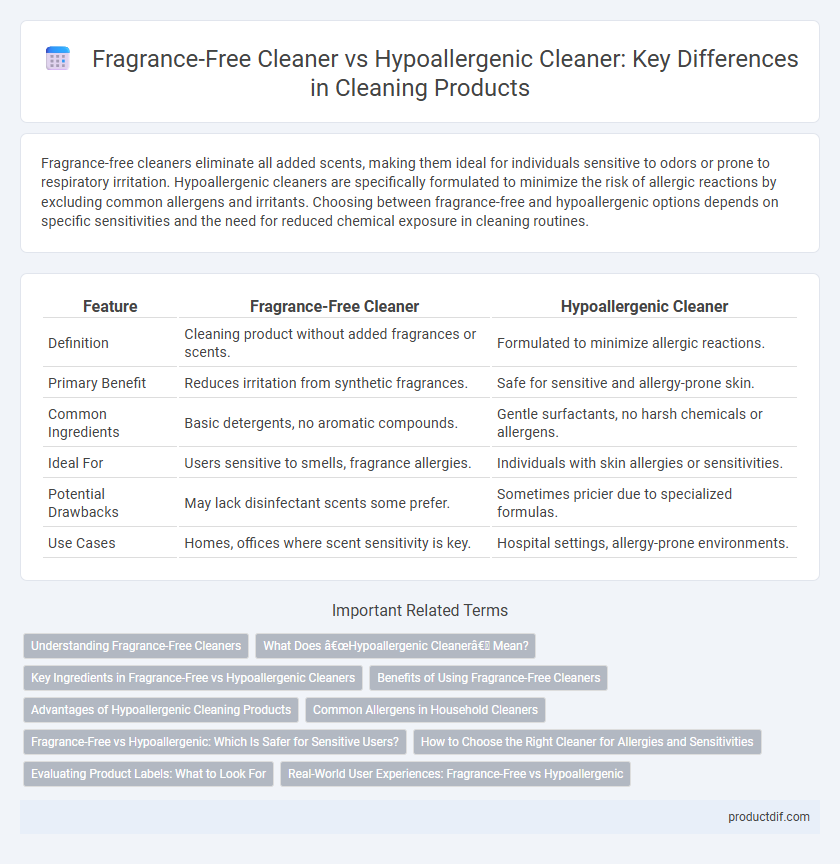Fragrance-free cleaners eliminate all added scents, making them ideal for individuals sensitive to odors or prone to respiratory irritation. Hypoallergenic cleaners are specifically formulated to minimize the risk of allergic reactions by excluding common allergens and irritants. Choosing between fragrance-free and hypoallergenic options depends on specific sensitivities and the need for reduced chemical exposure in cleaning routines.
Table of Comparison
| Feature | Fragrance-Free Cleaner | Hypoallergenic Cleaner |
|---|---|---|
| Definition | Cleaning product without added fragrances or scents. | Formulated to minimize allergic reactions. |
| Primary Benefit | Reduces irritation from synthetic fragrances. | Safe for sensitive and allergy-prone skin. |
| Common Ingredients | Basic detergents, no aromatic compounds. | Gentle surfactants, no harsh chemicals or allergens. |
| Ideal For | Users sensitive to smells, fragrance allergies. | Individuals with skin allergies or sensitivities. |
| Potential Drawbacks | May lack disinfectant scents some prefer. | Sometimes pricier due to specialized formulas. |
| Use Cases | Homes, offices where scent sensitivity is key. | Hospital settings, allergy-prone environments. |
Understanding Fragrance-Free Cleaners
Fragrance-free cleaners contain no added perfumes or scented chemicals, making them ideal for individuals with sensitive skin or allergies. These products reduce the risk of respiratory irritation and allergic reactions often triggered by artificial fragrances. Understanding the ingredient list is crucial, as some fragrance-free cleaners may still include masking agents that can affect sensitive users.
What Does “Hypoallergenic Cleaner” Mean?
A hypoallergenic cleaner is specifically formulated to minimize the risk of allergic reactions by avoiding common irritants such as fragrances, dyes, and harsh chemicals. Unlike fragrance-free cleaners that simply lack added scents, hypoallergenic cleaners undergo rigorous testing to ensure they are safe for sensitive skin and respiratory conditions. These products often contain gentle, non-toxic ingredients designed to reduce allergens and provide effective cleaning without triggering sensitivities.
Key Ingredients in Fragrance-Free vs Hypoallergenic Cleaners
Fragrance-free cleaners typically rely on basic surfactants and solvents without added scents to minimize irritation for sensitive skin. Hypoallergenic cleaners include ingredients specifically chosen to reduce allergic reactions, often incorporating mild, non-irritating agents like aloe vera or chamomile extracts. Both formulations avoid harsh chemicals like parabens and phthalates to ensure safer cleaning for allergy-prone individuals.
Benefits of Using Fragrance-Free Cleaners
Fragrance-free cleaners minimize the risk of allergic reactions and respiratory irritation, making them ideal for sensitive individuals and those with asthma. They reduce exposure to synthetic chemicals often found in scented products, promoting a healthier indoor air quality. Using fragrance-free cleaners supports a safer environment by eliminating unnecessary allergens and irritants commonly introduced by added fragrances.
Advantages of Hypoallergenic Cleaning Products
Hypoallergenic cleaning products minimize the risk of allergic reactions by avoiding common irritants like dyes, fragrances, and harsh chemicals, making them ideal for sensitive skin and respiratory conditions. These cleaners often use gentle, non-toxic ingredients that maintain effective cleaning power while reducing environmental impact and chemical exposure. Choosing hypoallergenic products supports healthier indoor air quality and enhances safety for children, pets, and individuals with allergies or asthma.
Common Allergens in Household Cleaners
Fragrance-free cleaners eliminate added scents, reducing the risk of irritation from synthetic fragrances often found in household products. Hypoallergenic cleaners are formulated to minimize common allergens such as dyes, preservatives, and surfactants that can trigger allergic reactions. Both options target sensitivities, but fragrance-free cleaners specifically address airborne allergens caused by perfumes, while hypoallergenic variants focus on minimizing contact allergens.
Fragrance-Free vs Hypoallergenic: Which Is Safer for Sensitive Users?
Fragrance-free cleaners contain no added scents, reducing the risk of irritation for users with fragrance sensitivities, while hypoallergenic cleaners are formulated to minimize common allergens and reduce allergic reactions. For individuals with sensitive skin or respiratory issues, fragrance-free products often provide safer options as they eliminate potential triggers found in fragrances. Hypoallergenic cleaners may still contain mild ingredients that could cause reactions, making fragrance-free the preferred choice for maximum sensitivity protection.
How to Choose the Right Cleaner for Allergies and Sensitivities
Choosing the right cleaner for allergies and sensitivities involves understanding the differences between fragrance-free and hypoallergenic products. Fragrance-free cleaners contain no added scents, reducing the risk of irritation for individuals sensitive to odors, while hypoallergenic cleaners are formulated to minimize common allergens and irritants, making them suitable for a broader range of skin and respiratory sensitivities. Reading labels for ingredient transparency and consulting allergy-specific recommendations ensures the selection of a product that effectively cleans without triggering allergic reactions.
Evaluating Product Labels: What to Look For
When evaluating product labels for fragrance-free cleaners, check for the absence of synthetic or natural fragrances, ensuring all listed ingredients confirm no added scents. For hypoallergenic cleaners, look for certifications or claims indicating the product is tested to minimize allergic reactions, and verify it is free from common allergens such as dyes, parabens, and strong preservatives. Prioritize cleaners with transparent ingredient lists and third-party testing to guarantee safety and suitability for sensitive skin.
Real-World User Experiences: Fragrance-Free vs Hypoallergenic
Real-world users of fragrance-free cleaners often report fewer respiratory irritations and allergies compared to those using scented alternatives, emphasizing the absence of artificial fragrances reduces sensitivity reactions. Hypoallergenic cleaners, designed to minimize allergens, are frequently praised for their gentle formulation suitable for sensitive skin, though some users note variability depending on individual triggers. Both product types demonstrate effectiveness in minimizing allergic responses, but personal experiences suggest fragrance-free options may provide a broader comfort range for those prone to fragrance sensitivity.
Fragrance-Free Cleaner vs Hypoallergenic Cleaner Infographic

 productdif.com
productdif.com